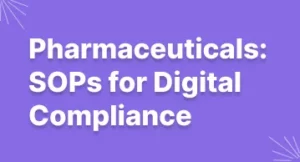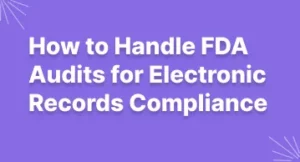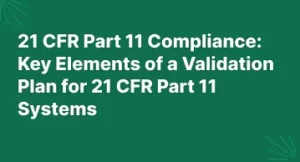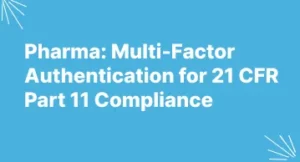Unpacking the Regulations: Understand 21 CFR 1271
What is 21 CFR 1271?
21 CFR 1271 is a regulation set forth by the US Department of Health and Human Services (HHS) that addresses the manufacturing, processing, and labeling of human cell tissue and cellular and tissue-based products (HCT/Ps). The regulation, also known as “The Current Good Tissue Practice (CGTP)”, ensures the highest standards are met for safety, efficacy, and purity of these products.
The regulation controls various aspects of HCT/P production from donor eligibility, testing, and selection to manufacturing process, labeling, and storage.
Historical Context of 21 CFR 1271
The regulation 21 CFR 1271, also known as the Human Cells, Tissues, and Cellular and Tissue-Based Products (HCT/Ps) Regulations, was established in 2005. This regulation was introduced by the United States Food and Drug Administration (FDA), in response to increasing awareness of potential risks from human tissue products and to prevent potential contamination. It was established to ensure the safety of human cells, tissues, and cellular and tissue-based products which are intended for human use.
The 21 CFR 1271 was substantially revised in April 2019 in order to clarify regulatory requirements, update terminology, and ensure compliance with the Cellular, Tissue and Gene Therapies Advisory Committee (CTGTAC) recommendations. This revision was the first since the inception of the regulations in 2005 and was based on recommendations from public stakeholder meetings held by FDA in 2017 and 2018.
The 21 CFR 1271 is important as it sets forth requirements related to the donor eligibility determination, the collection and handling of HCT/Ps, and the establishment of related records. Additionally, it requires that all entities who manufacture HCT/Ps adhere to good tissue practice (GTP) and good manufacturing practices (GMP).
21 CFR 1271
21 CFR 1271 is a section of the Code of Federal Regulations (CFR) that outlines regulations specific to human cells, tissues, and cellular and tissue-based products (HCT/Ps). This part of the CFR contains the guidelines and requirements for receiving approval to manufacture and market HCT/Ps in the United States.
Historical Context of Regulation
In 1988, the FDA issued the Core Required Guidelines (CRG) for manufacturing and testing HCT/Ps. These guidelines were the starting point for establishing safety standards for all human tissue products prior to their release. Over the next two decades, the CRG was updated several times and, eventually, the 21 CFR 1271 was established in 2003 as the official regulation.
Terms of the Regulation and Their Meaning
The 21 CFR 1271 consists of several core terms and definitions related to the processing, manufacturing, and marketing of HCT/Ps. Some of these include:
- Donor Eligibility Assessment: This involves evaluating the health of potential donors prior to the transfer of HCT/Ps. It includes verifying medical history, conducting a physical examination, and sometimes requires blood and other tests.
- Tissue Procurement Processes: This involves obtaining HCT/Ps from donors and ensuring that the tissue is properly collected, tested, and processed.
- Expiration Dating: This involves labeling HCT/Ps with the appropriate date of expiration to prevent use of products beyond their recommended shelf life.
- Tissue Processing and Sterilization: To ensure the safety of HCT/Ps, this includes decontamination processes such as disinfection, inactivation, or sterilization.
Outlining Significant FDA Guidance Documents Related to the 21 CFR 1271
The United States Food and Drug Administration (FDA) develops and issues guidance documents related to the 21 CFR 1271. These documents provide an overview of the regulation and its scope and intent. The following are some of the most significant FDA guidance documents related to 21 CFR 1271:
- Guidance for Industry – Tissue and Cell Processing: This document provides guidance on methods and requirements for collecting, processing, storing, and transporting cells and tissues for transplantation.
- Draft Guidance for Industry – Donor Screening and Testing: This document outlines the standards for donor eligibility and tissue testing in accordance with 21 CFR 1271.
- Guidance for Industry – Sterilization of Human Cells, Tissues, and Cellular and Tissue-Based Products: This provides manufacturers with recommendations for different types of sterilization processes for HCT/Ps.
How the Regulation is Enforced by FDA
The FDA is responsible for enforcing the 21 CFR 1271 regulation. This includes inspecting facilities and reviewing records to ensure compliance. Non-compliance with the 21 CFR 1271 regulations can result in various penalties, including fines, product seizure or destruction, suspension of operations, and even criminal prosecution.
Relevant Case Studies for Understanding 21 CFR 1271
It is important to understand how the 21 CFR 1271 regulation is enforced and how manufacturers have been penalized in the past for non-compliance. There are several case studies that illustrate examples of FDA enforcement and penalties:
- Biomedical Tissue Services Case Study: In 2006, Biomedical Tissue Services was shut down for numerous violations of the 21 CFR 1271 regulation, including the use of counterfeit donor consent forms, mislabeling of tissue products, and improper tissue processing.
- Advanced BioHealing Case Study: In 2011, Advanced BioHealing was charged with multiple violations of 21 CFR 1271, including not following proper donor screening procedures and not validating their production process.
Requirements for Compliance with the Regulations
Manufacturers of HCT/Ps must comply with the 21 CFR 1271 to ensure tissue safety and
Outlining Significant FDA Guidance Documents Related to 21 CFR 1271
21 CFR 1271 is a U.S. Food and Drug Administration (FDA) regulation that outlines the requirements for human cells, tissues, and cellular and tissue-based products (HCT/Ps). The regulation includes provisions regarding donor eligibility, manufacturing requirements, quality control, records, and labeling rules.
In order to ensure compliance with 21 CFR 1271, the FDA has issued multiple guidance documents that provide clarification on various aspects of the regulation. Below are some of the most significant guidance documents related to 21 CFR 1271.
- Quality System Regulation (QSR): The FDA issued the Quality System Regulation (QSR) in 1997 as an initiative to ensure quality, safety, and efficacy in all medical devices while reducing risk associated with manufacturing. The QSR applies to any company that manufactures, distributes, installs, packages, labels, services, or repairs devices used to diagnose, treat, or prevent disease or other conditions in humans.
- Donor Eligibility Guidance: This document provides detailed information about the requirements for donor screening and eligibility. It outlines criteria used to assess, determine, and verify a donor’s eligibility for donation of human cells, tissues, and cellular and tissue-based products.
- Control of Contamination and Disinfectants and Sterilization Processes: This guidance document outlines the requirements for controlling microbial contamination in HCT/Ps through disinfection and sterilization processes. It provides information on determining which disinfectants are appropriate for use and what equipment should be used for sterilization.
- General Recommendations for Donor Screening and Testing: This document provides detailed advice and recommendations for donor screening and testing of HCT/Ps, including guidelines for donor history interviews and laboratory testing.
- Labeling Requirements for Human Cells, Tissues, and Cellular and Tissue-Based Products: This guidance document outlines the labeling requirements for HCT/Ps, including information on labels, package inserts, and brochures.
How is 21 CFR 1271 Enforced?
The FDA is responsible for enforcing the 21 CFR 1271 regulations. They have the authority to review and audit manufacturers to determine whether or not they are compliant with the regulation, and to take enforcement action if they find violations. This could include seizure or injunction proceedings, civil money penalties, or criminal prosecution.
It is critical for all manufacturers to understand the requirements of 21 CFR 1271 and to be vigilant in their efforts to ensure compliance. This includes having stringent procedures in place to conform to the guidance documents issued by the FDA, as well as conducting regular reviews and audits of their own processes.
The FDA also conducts inspections of manufacturing facilities, looking for evidence of violations. If any issues are found, the FDA may issue a warning letter which requires corrective action, or order a recall of products.
Relevant Case Studies for Understanding 21 CFR 1271
For non-medical device manufacturers, understanding the complexities of 21 CFR 1271 can be daunting. To help get a better understanding of the regulation an understanding of relevant case studies is important. The two most common examples discussed are the Supreme Court ruling in 2011 on the FDA’s Medical Device Amendment, and the 9th U.S Circuit court of appeals ruling in 2014 about the off-label promotion of a pharmaceutical product.
The Supreme Court ruling as it pertains to 21 CFR 1271 was that the FDA could not regulate medical devices under the scope of 21 CFR 1271 due to a lack of evidence of harm or potential harm from the device. This case was important as it resulted in the FDA having to adjust their policy and create separate regulations for medical devices.
The 9th U.S Circuit court of appeals case had to do with the off-label promotion of a product. The appeal court found that 21 CFR 1271 did not apply to off-label promotion of products as this was not an activity that fell under the scope of the regulation. As such, this court ruling affirmed the need for FDA regulations specific to off-label promotion.
These two cases demonstrate the complexity of 21 CFR 1271, and show how courts have interpreted the regulations differently. It is important to understand these cases when considering 21 CFR 1271 have to ensure compliance.
Requirements for Compliance with 21 CFR 1271
The regulation known as 21 CFR 1271, outlines specific requirements for all concerned parties including manufacturers, importers, wholesalers, health care facilities and distributors. Manufacturer must establish and maintain a written established standard of procedures for processes and production operations related to the manufacture of Human Cells, Tissues and Cellular and Tissue-Based Products (HCT/Ps).
Manufacturers must also register with the FDA in accordance to 21 CFR 1271, and include their establishments on their registration. This will certify that the responsible person has verified each manufacturer’s process and operations are in compliance with the regulations outlined in FDA guidelines.
In addition to these regulatory requirements, manufacturers are obligated to meet quality control standards. Manufacturers must ensure each step of the manufacturing process meets the parameters of safety set forth by the organization. Additionally, they must keep records of all operations and document any corrections made. All manufacturing operations must be conducted under the supervision of a qualified individual with the authority to stop operations in case of noncompliance with FDA regulations.
Health care facilities and distributors, on the other hand, must adhere to the regulations listed in Parts 1270 and 1271 of Title 21. This includes having and maintaining adequate records of all HCT/P operations, such as storage, disposal, and distribution. Records must be maintained for at least 10 years from the date of distribution of the product.
Furthermore, those organizations which engage in the distribution and importation of products must only purchase HCT/Ps from licensed and registered sources. Any unregistered or unlicensed source will require authorization from the FDA prior to engaging in the purchase and distribution of such products.
Finally, in order to be in full compliance with 21 CFR 1271, all companies and individuals dealing in HCT/Ps must abide by the requirements set forth by the FDA. Failure to do so may result in civil or criminal penalties.
Resources Available for Learning About 21 CFR 1271
In order to stay up-to-date on 21 CFR 1271 regulations, there are many resources available. The FDA website is the best place to search for current information and guidance documents related to the regulation. It is also possible to sign up for email notifications to receive alerts on important changes and developments. Additionally, several professional organizations, such as the International Society for Cellular Therapy, offer informational webinars and conferences on 21 CFR 1271. Associations and companies may provide resources specific to their industry or sector. Finally, there are a number of books and other publications that provide in-depth information about 21 CFR 1271.
21 CFR 1271 is an important set of regulations maintained by the United States Food & Drug Administration (FDA). It sets out specific criteria for which tissues and cells intended for use in humans are regulated. The 21 CFR 1271 regulation applies to all stages of tissue and cell-based products, including procurement, processing, storage, labeling, and distribution. Understanding the requirements of the 21 CFR 1271 helps healthcare providers, tissue banks, and tissue processors to meet the necessary standards for tissue and cell safety, quality, and efficacy.
This guide will introduce 21 CFR 1271 and its history, explain the terms and regulations, outline FDA guidance documents related to it, and provide relevant case studies for understanding the requirements for compliance. In addition, this guide details resources available for learning about 21 CFR 1271, summarizes the points discussed, and provides internal and external links for further reading.
Meta Data Description Navigate Towards Target Search Terms
When writing content that is targeted towards specific keywords or search terms, it is important to use the correct meta data descriptions. This includes things like your page title, and meta description tags. They should be meaningful and relevant to the article, and should contain the primary keyword or phrase as well as related terms. For example, if the article is about 21 CFR 1271, then a page title should include the words “21 CFR 1271” as well as related terms like “FDA regulations” or “gene therapy”. Similarly when crafting the meta description tag, use these same terms and tailor it towards the target audience.
When it comes to search engine optimization (SEO) for 21 CFR 1271, there are certain steps that must be taken to ensure high visibility online. The first step is to make sure that the website has relevant keywords related to the regulation. This will help potential customers find the website when searching online. Additionally, it is important to include the target keyword in Meta Data Description, headlines, and copy as well as using internal links and external links to related content. Proper SEO optimization can help drive more traffic to the website and ensure that potential customers have the best experience possible when researching 21 CFR 1271.
21 CFR 1271 is an important regulation introduced by the US Food and Drug Administration or FDA. This regulation was established to ensure the safety of human cells, tissues, and cellular and tissue-based products (HCT/Ps). It plays an important role in regulating these products so that they meet federal standards for quality and safety.
In order to understand 21 CFR 1271, it is important to know its historical context. This regulation was issued in 2002 as part of a larger overhaul of the existing FDA requirements for HCT/P manufacturing. Prior to its introduction, there were many loopholes in the existing regulations. The FDA sought to close these loopholes by introducing 21 CFR 1271.
The terms of this regulation apply to any product that is composed of or derived from human cells or tissues, such as cell cultures, stem cells, bone marrow, and organ transplants. The regulation requires that each product must meet certain standards of purity and safety before it can be marketed or sold. In addition, it outlines specific requirements for donor screening, tissue processing, labeling, and record keeping.
The FDA has also released several guidance documents in conjunction with the 21 CFR 1271 regulation. These documents provide additional information on the requirements for manufacturing, testing, screening, and labeling of HCT/P products.
The FDA monitors compliance with 21 CFR 1271 through inspections and investigations. If products are found to be non-compliant, the FDA may issue warning letters or take enforcement action against the manufacturer or distributor.
Understanding 21 CFR 1271 may be made easier by examining relevant case studies. For example, the FDA has taken enforcement action against a manufacturer for not meeting the standards outlined in 21 CFR 1271. Through this case study, it is easy to see how the regulation applies in practice.
In order to comply with 21 CFR 1271, manufacturers must ensure that their products meet the necessary quality and safety standards. They must also keep detailed records of donor screening, tissue processing, labeling, and other aspects of product manufacturing.
There are numerous resources available to help learn more about 21 CFR 1271. These include the FDA’s official website, guidance documents, and case studies. Additionally, organizations like the Association for the Accreditation of Human Research Protection Programs provide helpful information on the regulation.
In summary, 21 CFR 1271 is an important regulation issued by the FDA to ensure the safety of HCT/P products. It sets out stringent requirements for manufacturers and distributors, including donor screening, tissue processing, labeling, and record keeping. To comply with the regulation, manufacturers must take all necessary steps to ensure that their products meet the necessary quality and safety standards. Additionally, there are numerous resources available to help learn more about 21 CFR 1271.
FAQs About 21 CFR 1271
1. What is 21 CFR 1271?
21 CFR 1271 is a informational regulation that provides details on the manufacturing, processing, packaging and storage of human cells, tissues, and cellular and tissue-based products (HCT/Ps). It is enforced under the authority of the US Food and Drug Administration (FDA).
2. What is the historical context of the 21 CFR 1271 regulation?
The 21 CFR 1271 regulation was introduced in 1997 by the FDA as an extension of the Public Health Service Act. Its purpose was to establish standards for ensuring the safety of donated HCT/Ps for therapeutic use.
3. What are the terms of the 21 CFR 1271 regulation?
The 21 CFR 1271 regulation outlines several important concepts including donor eligibility criteria, testing procedures, processes for product recovery and labeling, as well as regulations concerning the certification, registration and approval of HCT/Ps.
4. What FDA guidance documents relate to 21 CFR 1271?
The FDA issues several guidance documents that provide more information and direction related to the 21 CFR 1271 regulation. These documents include the Draft Guidance for Labeling Human Cellular and Tissue-Based Products, Guidance for Donor Eligibility Mean Testing for Human Cells, Tissues and Cellular and Tissue-Based Product and Guidance on Deciding When to Submit an IND or BLA for a Cellular or Tissue-Based Product.
5. How is the 21 CFR 1271 regulation enforced by the FDA?
The 21 CFR 1271 regulation is enforced actively by the FDA through inspections and periodic reviews of manufacturing facilities and processes. Additionally, any violations observed or found during inspections can result in detention, injunction and other forms of enforcement.
6. What resources are available for learning about 21 CFR 1271?
There are several resources available for understanding 21 CFR 1271, including the FDA’s website, the International Conference on Harmonization (ICH) and other regulatory organizations. Additionally, industry organizations like the Alliance for Coding and Nomenclature (ACN) or the Association of Biological Resource Facilities (ABRF) can be valuable sources of information and guidance.
7. What are the requirements for compliance with the 21 CFR 1271 regulation?
The requirements for compliance with the 21 CFR 1271 regulation include the establishment and maintenance of policies and procedures that ensure donor eligibility criteria are met, product labels are accurate, and that proper manufacturing and processing operations are followed. Additionally, individual states may have their own rules and regulations which must also be followed.





